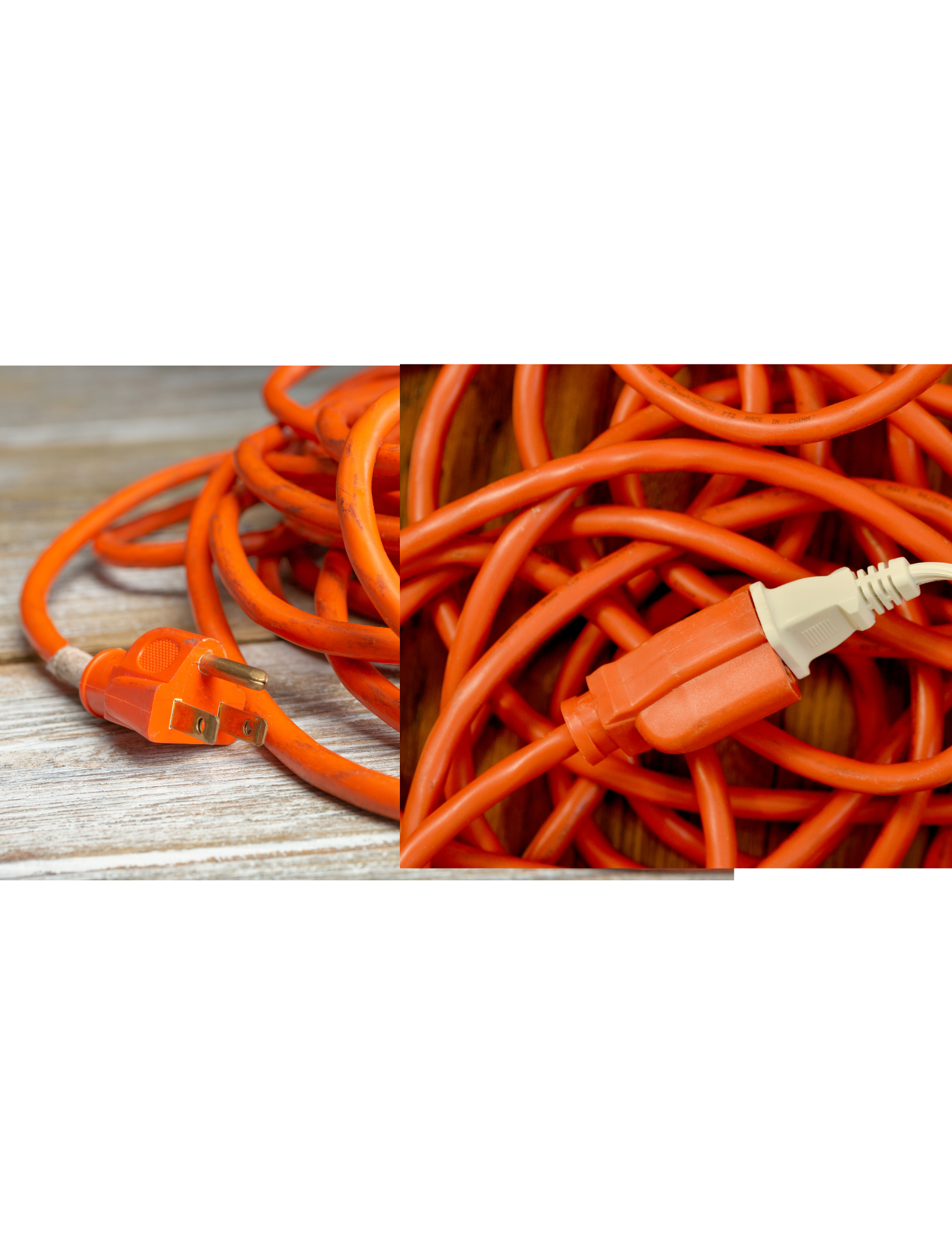The Hidden Danger of Overusing Extension Cords in Your Home: What You Need to Know
Extension cords are an incredibly convenient solution for powering up devices that are too far from electrical outlets. Whether it’s to charge your phone, connect a lamp, or plug in a home appliance, they often seem like the perfect fix for our modern needs. But how many of us have considered the hidden dangers of overusing extension cords?
While extension cords provide short-term convenience, their overuse can present significant safety risks, especially when they're used improperly or for extended periods. In this blog, we'll explore the hidden hazards of over-relying on extension cords and share some practical tips on how to use them safely.
Why We Rely Too Much on Extension Cords
In older homes or spaces with insufficient electrical outlets, extension cords become an easy, fast fix. Instead of calling an electrician to install new outlets, we often grab a cord and solve the problem instantly.
This behavior might seem harmless, but it leads to an unhealthy reliance on these temporary devices. The increasing number of gadgets we use—laptops, smart TVs, phone chargers, kitchen appliances—exacerbates the situation. Most homes simply weren’t built to accommodate the electrical demand we place on them today, leading us to plug more and more into these cords.
The Dangers of Overusing Extension Cords
While extension cords are useful, they can turn into potential fire hazards when misused. Here's why:
1. Overloading Circuits
Every extension cord has a specific capacity, usually indicated by its gauge (thickness) and length. Overloading it by plugging in too many devices or high-wattage appliances can cause the cord to overheat. This heat can lead to the melting of the cord’s insulation, sparking a fire hazard.
Imagine plugging in a space heater, a phone charger, and a TV into one extension cord. While it might seem fine, if that cord isn’t designed to handle the combined load, it could be a recipe for disaster.
2. Poor Quality Cords
Not all extension cords are created equal. Cheaper, lower-quality cords often lack proper insulation or grounding. They may also not be designed for heavier appliances or long-term use. This increases the risk of electrical shocks, short circuits, and fires.
3. Tripping Hazards
Long extension cords running across rooms or under carpets are not only unsightly but also pose tripping hazards. A fall caused by an exposed cord can result in injury, especially for children or older adults. Running cords under carpets or rugs adds to the fire risk, as the heat generated has nowhere to escape.
4. Wear and Tear
Extension cords are not meant to be permanent solutions. Over time, they can deteriorate. Constant twisting, bending, or exposure to the elements (for outdoor cords) can wear down the insulation. This wear increases the risk of electrical arcing, which can ignite a fire.
5. Misuse of Power Strips
Many people connect power strips to extension cords, a practice known as "daisy-chaining." While it may seem convenient, this practice is extremely dangerous. Daisy-chaining increases the load on the extension cord, potentially exceeding its capacity and leading to overheating.
How to Use Extension Cords Safely
Though extension cords can pose risks, there are ways to use them safely when necessary. Here are some simple precautions to follow:
Check the wattage rating. Always use an extension cord that’s rated for the appliances you're plugging in. Don’t guess—check the capacity of both the cord and the device.
Limit usage duration. Extension cords should be used as temporary solutions, not permanent fixes. If you’re constantly relying on them, it might be time to install additional outlets.
Avoid overloading. Don’t plug too many devices into one extension cord. High-wattage appliances, like space heaters or air conditioners, should always be plugged directly into a wall outlet.
Inspect cords regularly. Look for signs of wear and tear, including fraying, cracking, or exposed wires. If a cord looks damaged, stop using it immediately.
Never run cords under rugs. This traps heat and can easily cause the cord to overheat.
Use surge protectors. For devices like computers and TVs, use a surge protector instead of a regular extension cord. These provide added safety by preventing power surges from damaging your equipment.
Signs You're Overusing Extension Cords
It’s easy to overlook how many cords are being used in your home. Here are a few red flags to watch for that suggest you may be over-relying on them:
- Your cords feel warm to the touch.
- You notice flickering lights or devices randomly turning off when plugged in.
- There’s a tangle of extension cords and power strips all over your home.
- You’ve had to reset a circuit breaker multiple times after plugging in several devices.
When to Call an Electrician
If you find that you constantly need extension cords to power essential appliances, it may be time to call in an electrician. An experienced professional can add more outlets or even upgrade your home’s electrical system to meet modern demands. Though this requires some investment, it is far safer than relying on temporary fixes.
Conclusion: Think Before You Plug
While extension cords can be a convenient solution, they are not without risks. Overloading, poor quality, and improper usage can all turn a helpful device into a potential fire hazard. Be cautious, use cords properly, and remember that they are meant for temporary use only. By taking these precautions, you can ensure that your home stays safe and powered—without relying on risky shortcuts.
Remember, it's always better to invest in a long-term electrical solution than risk the safety of your home and loved ones.

